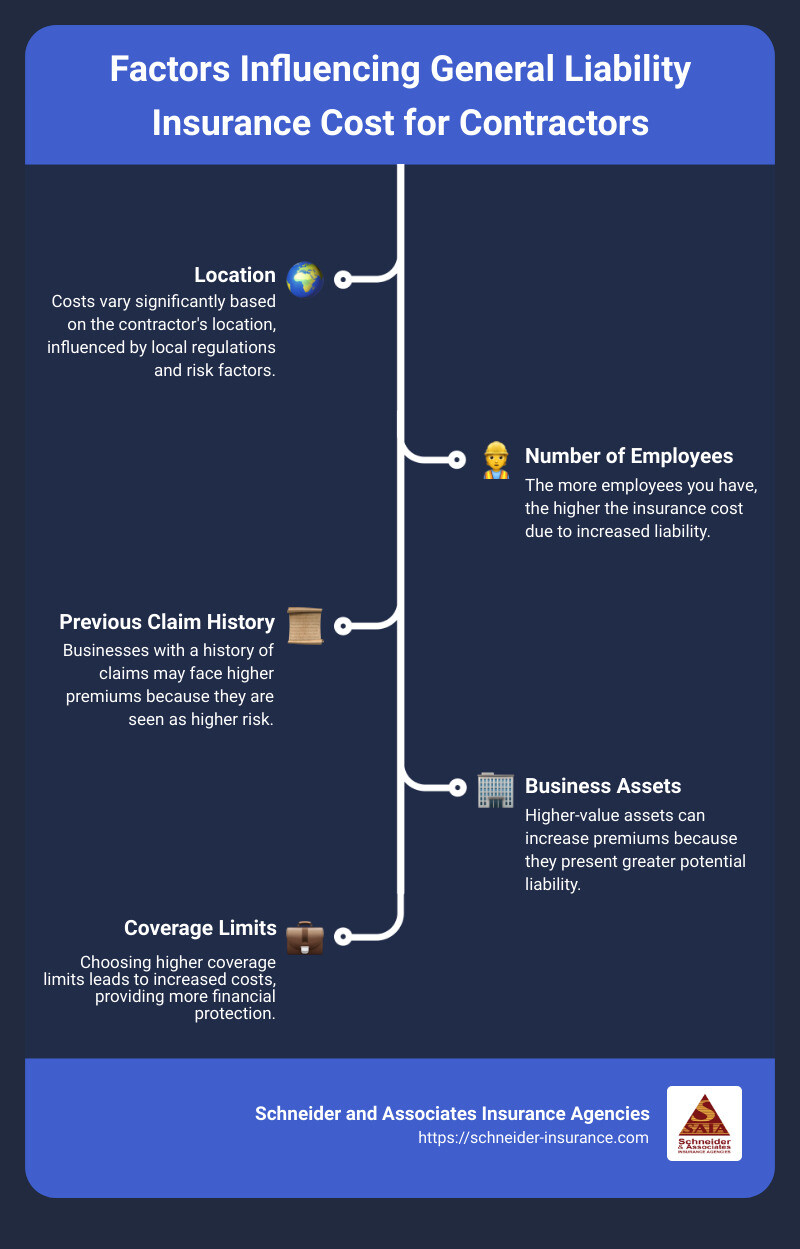The True Cost of General Liability Insurance for Contractors: A Comprehensive Guide

General liability insurance cost for contractors is an essential topic for those in the construction and contracting industry. To make it clear and simple, here are the key takeaways you need to know:
Average monthly cost: $112 (including Bundled Liability Insurance)Factors influencing costs: Coverage amounts, number of employees, previous claims, and business assets
General liability insurance provides crucial financial protection, covering physical and property damage caused by your business operations. Imagine facing a steep legal bill due to a jobsite accident—without proper coverage, this could severely impact your business’s financial health.
My name is Paul Schneider, and with over 20 years of experience in the insurance industry, I specialize in helping contractors understand and manage their insurance needs. Let’s dive into why general liability insurance cost for contractors is an investment you can’t afford to skip.

What is General Liability Insurance?
General Liability Insurance is a fundamental coverage for contractors, providing a safety net against various risks that could otherwise jeopardize your business. But what exactly does it cover, and why is it so essential?
Definition
At its core, General Liability Insurance (GL) protects your business from financial loss due to claims of injury or damage caused by your operations, employees, or services. It’s often referred to as “business liability” or “commercial general liability” insurance.
Coverage
General Liability Insurance typically covers:
Bodily Injury: This includes medical expenses and legal fees if someone is injured on your job site. For example, if a client trips over a piece of equipment and breaks their leg, GL insurance would cover their medical bills and any legal costs if they sue.Property Damage: If your work accidentally damages someone else’s property, this coverage will handle the repair or replacement costs. Imagine you’re installing a new kitchen and accidentally cause a fire that damages the client’s home. General Liability Insurance steps in to cover the costs.Personal and Advertising Injury: This includes harm caused by your advertising activities, such as defamation, libel, or copyright infringement. For instance, if your marketing campaign accidentally uses copyrighted material, this coverage helps manage the legal repercussions.Medical Payments: Covers minor medical costs for injuries that occur on your premises, regardless of fault. This is a goodwill gesture to avoid larger lawsuits.
Protection
Having General Liability Insurance provides a layer of protection that keeps your business running smoothly. It helps cover costs associated with:
Legal Defense: If someone sues your business, legal fees can quickly add up. GL insurance helps cover these costs, ensuring you have the best defense possible.Settlements and Judgments: If a court finds your business liable, this coverage helps pay for settlements or court-ordered judgments.Reputation Management: Claims against your business can harm your reputation. GL insurance can help manage and mitigate reputational damage through legal and public relations support.
Legal Protection
In many cases, having General Liability Insurance is not just a smart business move—it’s a legal requirement. Many states and clients require contractors to carry this insurance before they can start a project. It ensures that there’s a financial safety net in place, protecting both you and your clients from unforeseen incidents.
Learn more about the importance of General Liability Insurance


Understanding the true cost and value of general liability insurance for contractors is crucial. It’s more than just a policy; it’s a cornerstone of your business’s risk management strategy.
Next, let’s explore the factors that influence the general liability insurance cost for contractors.
Factors Influencing General Liability Insurance Cost for Contractors
When it comes to general liability insurance cost for contractors, several factors play a significant role. Understanding these factors can help you better estimate your insurance expenses and find ways to save.
Location
Where your business operates can greatly impact your insurance premiums. If you work in densely populated areas or regions with higher risks of accidents, expect to pay more. For example, contractors working in urban settings might face higher premiums due to the increased likelihood of property damage and bodily injuries.
Number of Employees
The size of your workforce matters. More employees mean a higher risk of accidents and claims. As your crew grows, so does your premium. This is because each additional employee increases the chances of something going wrong on the job site.
Previous Claim History
Your past claims can affect your future premiums. If you have a history of frequent or high-cost claims, insurers may see you as a higher risk and charge more. On the other hand, a clean claim history can help you secure lower rates.
Business Assets
The value of your business assets, including tools, equipment, and vehicles, can influence your insurance costs. Higher-value assets mean higher potential losses, leading to higher premiums. Ensuring all your assets are adequately covered is crucial, but it can also increase your overall costs.
Payroll
Your payroll size is another factor. Higher payrolls often correlate with larger operations and more extensive job sites, increasing the risk of incidents. Insurance companies consider this when calculating your premiums.
Coverage Limits
The limits of your coverage also play a role. Policies with higher coverage limits offer more protection but come at a higher price. For instance, opting for a $2 million policy instead of a $1 million policy will cost more but provide better security in case of a significant claim.
By understanding these factors, you can better navigate the complexities of general liability insurance cost for contractors and make informed decisions about your coverage needs.
Average Costs of General Liability Insurance for Contractors
When it comes to general liability insurance cost for contractors, understanding the average costs can help you budget effectively. Let’s break it down into monthly and annual costs, cost variations, and industry averages.
Monthly Costs
On average, general contractors can expect to pay between $66 and $102 per month for general liability insurance. This cost can vary based on several factors, including the size of your operation and the specific risks involved in your projects.
Annual Costs
Annually, the cost of general liability insurance for contractors ranges from $796 to $1,230. This is a significant expense, but it’s a necessary one to protect your business from potentially devastating financial losses due to accidents or other liabilities.
Cost Variations
The cost of general liability insurance can vary widely depending on:
Location: Working in a big city often increases premiums due to higher accident risks.Crew Size: More employees mean a higher chance of accidents, leading to higher costs.Coverage Limits: Higher coverage limits, like $2 million instead of $1 million, will increase your premiums.
For example, contractors in California might see different rates compared to those in Texas or Michigan. In California, the average monthly cost is around $144, while in Texas, it’s about $152.
Industry Averages
Across the construction industry, general liability insurance is one of the most expensive types due to the high risk of accidents. However, it’s crucial to compare your costs with industry averages to ensure you’re not overpaying.
General contractors pay an average of $1,230 per year, making it one of the higher-cost insurance types but essential for protecting your business.
By keeping these figures in mind, you can better plan for the costs associated with general liability insurance for contractors and ensure you have the necessary coverage to safeguard your business.
Next, let’s explore how you can save on general liability insurance.
How to Save on General Liability Insurance
Saving on general liability insurance cost for contractors is crucial for maintaining a healthy bottom line. Here are some practical tips:
Comparison Shopping
One of the easiest ways to save money is by comparison shopping. Insurance companies don’t price their policies the same way. By comparing quotes from different insurers, you can find the best deal for your needs.
Bundling Policies
Another effective strategy is bundling policies. Combining general liability insurance with other types of coverage, like commercial property insurance, in a Business Owner’s Policy (BOP) can lead to significant discounts.
Maintaining a Safe Work Environment
A safe work environment not only protects your employees but can also lower your insurance premiums. Implementing and documenting a safety program can make you eligible for discounts.
Choosing Appropriate Coverage Limits
While it might be tempting to go for the highest coverage limits, choosing appropriate coverage limits based on your actual needs can save you money. Evaluate the risks specific to your business and select limits that provide adequate protection without overpaying.
By following these tips, you can manage your general liability insurance cost for contractors more efficiently and ensure your business remains protected without breaking the bank.
Types of Coverage Included in General Liability Insurance
Understanding the types of coverage included in general liability insurance is crucial for contractors. Here’s a breakdown of the key coverage areas:
Bodily Injury
Bodily injury coverage protects against claims if someone is hurt due to your business operations. For example, if a client trips over your tools and injures themselves, this coverage can help pay for their medical expenses and any legal fees if they sue.
Fact: Bodily injury claims can be expensive. Without insurance, you might face costs that could severely impact your business.
Property Damage
Property damage coverage handles situations where your business activities cause damage to someone else’s property. Imagine you’re a painter and you accidentally spill paint on a client’s expensive carpet. This coverage would help cover the cost of cleaning or replacing the carpet.
Case Study: A contractor accidentally damaged a client’s window while working. The property damage coverage paid for the replacement, saving the contractor thousands of dollars.
Personal and Advertising Injury
Personal and advertising injury coverage includes protection against non-physical injuries that can occur in business. This can cover claims of libel, slander, wrongful eviction, or copyright infringement in your advertising.
Example: If you advertise your services and unintentionally defame a competitor, this coverage can help cover the legal costs and any settlements.
Medical Payments
Medical payments coverage is designed to cover minor medical expenses for injuries that happen on your business premises, regardless of who is at fault. This can help prevent small incidents from becoming major lawsuits.
Statistic: Quick payment of medical expenses can often prevent larger claims. Many policies offer $5,000 per person for medical payments.
By understanding these coverage types, you can better appreciate the value of general liability insurance and how it protects your contracting business from various risks.
Next, let’s explore additional insurance policies contractors should consider.
Additional Insurance Policies Contractors Should Consider
While general liability insurance is crucial, it’s not the only type of coverage contractors need. Here are some other essential policies to consider:
Workers’ Compensation Insurance
Why you need it: Most states require workers’ compensation insurance, even if you have just one employee. It covers medical expenses, lost wages, and disability benefits for employees who get injured or sick on the job.
Example: If an employee suffers a laceration while unloading materials at a job site, workers’ compensation insurance will cover their medical bills and lost wages during recovery.
Cost: Construction businesses and contractors pay an average of $254 per month for workers’ compensation insurance. This cost can vary based on the number of employees and the risk level of their duties.
Commercial Auto Insurance
Why you need it: If you use a vehicle for work-related tasks, such as meeting clients or transporting materials, personal auto insurance won’t cover business use. Commercial auto insurance is necessary for coverage.
Example: If you cause a car accident while driving your company car to a job site, commercial auto insurance covers property damage, medical costs, and legal expenses.
Cost: The average cost for commercial auto insurance is $173 per month. Factors influencing the cost include policy limits, the value of the vehicle, and drivers’ records.
Equipment Insurance
Why you need it: Contractor’s tools and equipment insurance covers the cost to repair or replace tools and equipment that are lost, stolen, or damaged.
Example: If someone swipes an expensive power saw from a job site, this insurance will cover the replacement cost.
Cost: On average, contractors pay $14 per month for this type of insurance. The cost depends on the value of your tools and equipment and the type of work you do.
Professional Liability Insurance
Why you need it: Also known as errors and omissions insurance, this covers you if a client claims your work was faulty or caused damage.
Example: If a client accuses you of poor workmanship that caused a leak and water damage, professional liability insurance covers legal costs, court judgments, and settlements.
Cost: Contractors pay an average of $74 per month for this coverage. It’s sometimes required for licenses and contracts, and the cost varies based on the type of business and policy limits.
Builder’s Risk Insurance
Why you need it: This insurance covers buildings under construction against damage from events like fire, theft, and vandalism. It’s essential for protecting your investment during a project.
Example: If a fire destroys part of a building you’re constructing, builder’s risk insurance will cover the repair costs.
Cost: The cost varies widely based on the project’s value and location. It’s usually a percentage of the total construction cost.
By considering these additional insurance policies, you can ensure comprehensive protection for your contracting business.
Frequently Asked Questions about General Liability Insurance Cost for Contractors
How much is a $2 million dollar insurance policy for a business?
The cost of a $2 million general liability insurance policy can vary based on several factors. On average, general liability insurance for contractors ranges from $796 to $1,230 per year. The higher the coverage limit, the more you can expect to pay.
Example: A contractor in a high-risk area with many employees might pay closer to the higher end of this range. However, a smaller operation in a less risky location could see costs on the lower end.
Are California contractors required to carry liability insurance?
Yes, California contractors are required to carry general liability insurance. This requirement helps protect both the contractor and their clients from potential financial losses due to accidents or damages.
Fact: According to California state law, licensed contractors must have a minimum of $1 million in general liability insurance.
How much is general contractor insurance in Florida?
In Florida, the cost of general contractor insurance can vary based on factors like location, number of employees, and the specific risks associated with the business.
Average Cost: Contractors in Florida might pay around $80 per month or $960 annually for general liability insurance. However, this can fluctuate based on the factors mentioned earlier.
Example: A contractor working in a densely populated area like Miami might see higher premiums due to increased risk, while those in less populated areas may pay less.
By understanding these common questions, contractors can better navigate the complexities of general liability insurance costs. Next, we’ll wrap up with personalized solutions and tailored coverage options from Schneider and Associates Insurance Agencies.
Conclusion
At Schneider and Associates Insurance Agencies, we understand that every contractor’s needs are unique. Personalized solutions are at the heart of what we offer. We work closely with you to assess your specific risks and requirements, ensuring that you get the coverage that best fits your business.
Our tailored coverage options mean you don’t have to settle for a one-size-fits-all policy. Whether you’re a general contractor, a homebuilder, or a specialty contractor, we can craft an insurance package that addresses your unique challenges. This approach not only provides peace of mind but also helps you manage your costs effectively.
We pride ourselves on our local touch. Being a part of your community allows us to offer insights and support that larger, impersonal agencies simply can’t match. Our team of experts is always ready to answer your questions, help you understand your policy, and assist you in filing claims.
To learn more about how we can help you protect your business with the right general liability insurance, visit our General Liability Insurance page.
Ready to get started? Contact us today to discuss your needs and get a customized quote. We’re here to ensure your business stays protected, so you can focus on what you do best—building and growing your business.







